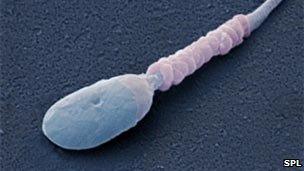Male infertility gene discovered
- Published

A faulty gene could help explain some cases of unexplained male infertility, according to research.
Mutations of the NR5A1 gene were found in a small percentage of infertile men, reports the American Journal of Human Genetics.
Scientists from the Pasteur Institute in France and University College London said it could help doctors investigating men with the condition.
A UK expert said he hoped that further gene defects could be found.
In the majority of cases, doctors can find no cause for male infertility, despite it accounting for up to half of cases in which couples have difficulty conceiving.
Male infertility appears to be more common within certain families, and this leads scientists to believe that there may be a genetic root for some cases, but only a handful of gene mutations which might be responsible have actually been found.
The latest research looks at a gene already known to be involved in sexual development in both men and women - defects in NR5A1 have been linked to physical defects in the development of the testicles or ovaries.
Their findings suggest that, even where there is no physical evidence of a problem, defects in the gene may be hampering the ability to make sperm.
They looked at the gene in 315 apparently healthy men who had an unexplained inability to produce sperm.
From this group, they found mutations in the gene in just seven, and closer examination revealed the men had altered levels of sex hormones and, in one case, mild abnormalities in the cellular structure of the testicles.
The research authors, from the UCL Institute of Child Health in London and the Institut Pasteur in Paris, said: "We conclude that approximately 4% of men with otherwise unexplained failure to produce sperm carry mutations in the NR5A1 gene."
Although the find would affect only a small proportion of infertile men, other specialists believe that other similar discoveries could help build up a clearer picture of the origins of the condition.
Dr Allan Pacey, a senior lecturer in andrology at the University of Sheffield, said that there was still "embarrassingly little" known about the genetics behind male infertility.
"Given the complexity of the sperm production process it is likely that many genes are involved and therefore that may gene defects linked to infertility may be found.
"Although this gene defect affects only a small number of men, we need more studies like this so that we can fill in the gaps in our knowledge and possibly one day build a robust diagnostic test for male fertility based on genetics."
- Published18 October 2007
- Published19 November 2009